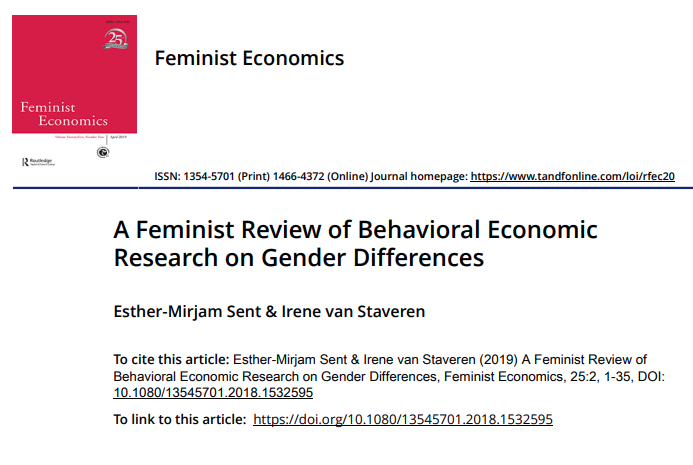While the conclusions it comes to are broadly correct, the article “A Feminist Review of Behavioral Economic Research on Gender Differences” by Sent and van Staveren should not be used as a model for methodology.
 In their article “A Feminist Review of Behavioral Economic Research on Gender Differences,” published in the April 2019 issue of Feminist Economics, Esther-Mirjam Sent and Irene van Staveren state that their work was inspired by my own work. In a series of articles (here, here, and here) and a book, I had performed meta-analyses of behavioral economics work concerning gender and risk-taking. Sent and van Staveren are to be commended for taking on the ambitious project of extending the focus to include investigations into not only risk, but also overconfidence, altruism, and trust. They also come to conclusions that are, based on my own investigation, broadly correct: “[F]ew studies report statistically significant as well as sizeable differences,” “large intra-gender differences (differences among men and differences among women) exist,” and “[m]any studies have not sufficiently taken account of various social, cultural, and ideological drivers.” I feel obligated, however, to point out that there are a number of methodological problems in their article. While the article is certainly notable, considerable caution should be exercised about taking its methods as a model for future work. Continue reading “A Caution about Sent and van Staveren’s “Feminist Review…””
In their article “A Feminist Review of Behavioral Economic Research on Gender Differences,” published in the April 2019 issue of Feminist Economics, Esther-Mirjam Sent and Irene van Staveren state that their work was inspired by my own work. In a series of articles (here, here, and here) and a book, I had performed meta-analyses of behavioral economics work concerning gender and risk-taking. Sent and van Staveren are to be commended for taking on the ambitious project of extending the focus to include investigations into not only risk, but also overconfidence, altruism, and trust. They also come to conclusions that are, based on my own investigation, broadly correct: “[F]ew studies report statistically significant as well as sizeable differences,” “large intra-gender differences (differences among men and differences among women) exist,” and “[m]any studies have not sufficiently taken account of various social, cultural, and ideological drivers.” I feel obligated, however, to point out that there are a number of methodological problems in their article. While the article is certainly notable, considerable caution should be exercised about taking its methods as a model for future work. Continue reading “A Caution about Sent and van Staveren’s “Feminist Review…””

 In their article “
In their article “